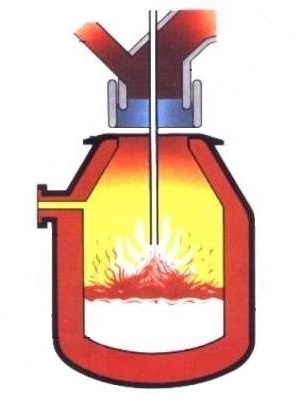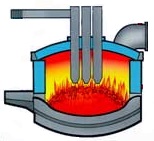![]() The basic units for steel production are basic oxygen (BOF) and electric arc (EAF) furnaces.
The basic units for steel production are basic oxygen (BOF) and electric arc (EAF) furnaces.
For the working lining of these units we offer periclase-carbon refractories utilizing high-quality fused and sintered periclase powders with low boron content as well as coarse-grained and flaked graphite with low ash, pitch with low impurities and synthetic resins. To produce products with special properties we add antioxidants such as aluminum, silicon and other powders as well as carbide and boride. The use of certain antioxidant depends on the location and operation conditions of refractory materials.
BASIC OXYGEN FURNACE

We offer a full range of shapes with lengths from 200 to 1100 mm enabling to carry out the lining of units of up to 400 tons each including the ones using a bottom blowing. We offer products for backup and working lining, tap-hole units for the whole campaign (precast or monolithic), ramming mixes, mixes for hot relining, backup welding materials, bottom blowing tuyers, hot relining units, taphole repair/replacing units.
We offer wide range of unshaped refractory materials – lining, repair and maintenance mixes, mortars, materials for sealing etc. For the production of basic ramming mixes high-quality sintered and fused periclase and alumina powders are used. Depending on the unit and the operating conditions we offer mixed made of carbon, chemical or ceramic binders. For the production of basic gunning mixes and mixes for tundish a wide range of sintered periclase powders is used. Depending on the operating conditions plasticate or surface-active agents may be added. Depending on the purpose unshaped materials can be delivered as finished products or as mixes which shall be moistened before use. The mixes can be applied by special machines or templates.
Selected products for the BOF working lining *
| Designation | Chemical analysis, % | Physical properties | Physical properties (1000C° x 2h) | |||||
| MgO** | C | Density, g/cm³ | Porosity, % | Compression strength, Mpa | Density, g/cm³ | Porosity, % | Compression strength, Mpa | |
| RI-MC01CC | 75 | 15 | ≥3,00 | ≤4,0 | ≥4,0 | ≥2,95 | ≤10 | ̴25 |
| RI-MC02CC | 78 | 12 | ≥3,04 | ≤4,0 | ≥4,0 | ≥2,99 | ≤8 | ̴30 |
| RI-MC06CC | 79 | 10 | ≥3,04 | ≤4,0 | ≥4,0 | ≥2,99 | ≤8 | ̴30 |
| RI-MC13CC | 80 | 7 | ≥3,05 | ≤4,0 | ≥4,0 | ≥3,0 | ≤6 | ̴35 |
Selected BOF ramming mixes *
| Designation | Chemical analysis, % | Physical properties | |||||||
| MgO | CaO | SiO2 | Fe2O3 | Cr2O3 | LOI | Apparent density g/cm³ | Compression strength @ 110C°/24h Mpa | Compression strength @1200C° Mpa | |
| RI-P01CC | 90 | 1,6 | 1 | - | 1,5 | 3,5 | 2,2 | 10 | - |
| RI-P02CC | 92 | - | 3 | - | - | 1 | 2,2 | 10 | - |
| RI-P03CC | 74 | - | 8 | 3 | - | 10 | 2 | - | 10 |
ELECTRIC ARC FURNACE
 As products for the converter lining, products for arc furnaces are manufactured almost of all standard sizes and configurations. We offer complete sets of refractory materials and equipment which include products for backup and working lining, bow knots for a whole campaign (precast or monolithic), ramming masses for a bottom, hot relining masses, back-up welding materials, hot lining repair unit.
As products for the converter lining, products for arc furnaces are manufactured almost of all standard sizes and configurations. We offer complete sets of refractory materials and equipment which include products for backup and working lining, bow knots for a whole campaign (precast or monolithic), ramming masses for a bottom, hot relining masses, back-up welding materials, hot lining repair unit.
Selected products for EAF working lining *
| Designation | Chemical analysis, % | Physical properties | Physical properties (1000C° x 2h) | |||||
| MgO** | C | Density, g/cm³ | Porosity, % | Compression strength, Mpa | Density, g/cm³ | Porosity, % | Compression strength | |
| Slag belt | ||||||||
| RI-MC01EC | 76 | 15 | ≤4,0 | ≥3,00 | ≥40 | 2,93 | 11 | 25 |
| RI-MC02EC | 79 | 12 | ≤4,0 | ≥3,02 | ≥40 | 2,96 | 8 | 30 |
| Walls | ||||||||
| RI-MC04EC | 80 | 10 | ≤4,0 | ≥3,02 | ≥40 | 2,96 | 8 | 30 |
| RI-MC05EC | 80 | 7 | ≤5,0 | ≥3,04 | ≥40 | 2,99 | 6 | 38 |
| Burners area | ||||||||
| RI-MC06EC | 78 | 12 | ≤4,0 | ≥3,00 | ≥40 | 2,95 | 10 | 28 |
Selected ramming and gunning mixes for EAF *
| Designation | Chemical analysis % | Physical properties | ||||
| MgO | CaO | SiO2 | Fe2O3 | Al2O3 | Bulk density g/cm³ | |
| RI-G01EC | 89 | 2,4 | 3,7 | 1,2 | 0,8 | 2,4 |
| RI-G02EC | 65 | 24 | 1,6 | 3,7 | 0,6 | 2,45 |
| RI-G08EC | 77 | 10 | 1,5 | 5,5 | 1,5 | 2,7 |
* – The values are typical and derived from existing standards. Not a specification.
** – The MgO figures are exclusive of the ignition losses.
